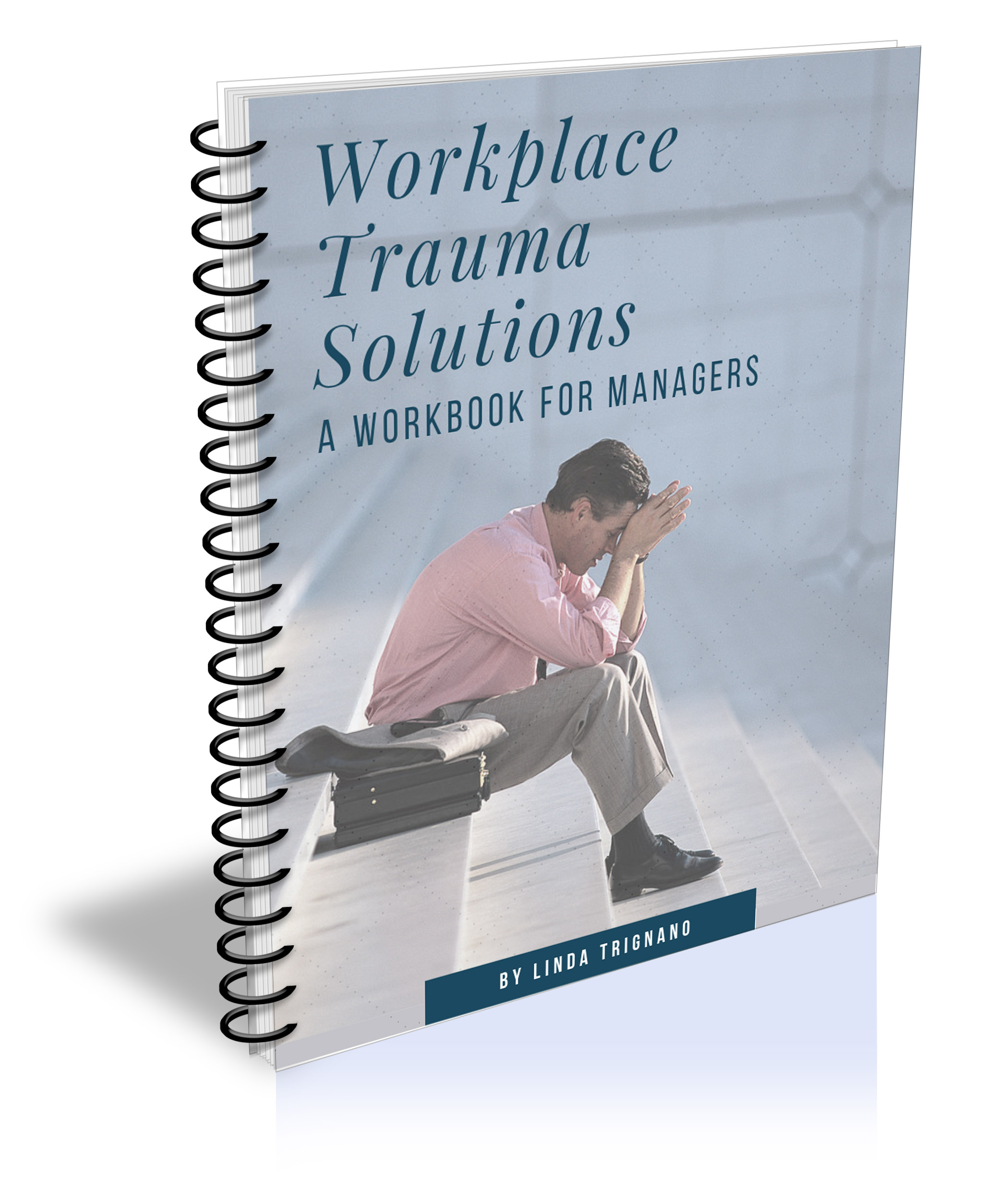Are you prepared to handle the disruption of trauma when it strikes your company?
With trauma, it is not a question of whether or not it will hit your company, it is a questions of WHEN.
This workbook is designed to assist your managers in providing SUPPORT for employees going through trauma, grief, or loss AND balance your business PRODUCTIVITY needs.
Why this workbook?
With four, or sometimes five generations in the workplace today, the chances are highly likely that your organization and your managers will experience some type of trauma, grief, or loss disruption and will have to manage through the disruption while keeping the work effort up.
Although your managers are sympathetic to the employee’s situation, this is most likely, not their most pressing issue and they figure that in time, it will resolve itself. It is understandable in today’s fast-paced business environment that it is difficult to take the time out to plan and prepare for such inevitabilities. However it is precisely the planning, the preparation, and the training that this workbook offers that will save you not only time, but money.
THIS WORKBOOK PROVIDES THE GUIDANCE YOU NEED TO EQUIP YOUR MANAGERS WITH THE SKILLS THEY NEED IN ORDER TO HELP THEIR EMPLOYEES DURING DIFFICULT TIMES OF TRAUMA, GRIEF AND LOSS.
THE WORKBOOK HELPS:
Guide you in providing support for your grieving employee.
Many managers don't know what to say or do and are overwhelmed when they have someone on their team who is going through trauma, grief, or loss. This workbook provides an effective step-by-step process to help managers support their grieving employee(s).
Keep the work effort up while providing support.
A delicate balance exists for the manager to provide support for their grieving employee(s) and to be aware of the impact on the morale of the entire team while focusing on keeping the work effort up. This workbook gives you the tools to balance support with confidence.
Provide guidance and steps for setting up a bereavement policy.
Develop and formalize a trauma and bereavement policy before a loss occurs and ensure that your managers know the details and are ready to use it.
Utilize the grief/trauma checklists at the precise time they are needed.
Not knowing what to do or when to do certain trauma/grief related tasks often causes more uncertainty and often leads to avoidance on the part of many team members. This workbook provides comprehensive checklists that guide you and can be utilized a precisely the time that you need them.
MANAGERS THINK THAT BECAUSE THEY ARE NOT CURRENTLY DEALING WITH A TRAUMA OR LOSS IN THEIR COMPANY, THEY DO NOT NEED TO PREPARE FOR SUCH AN EVENT.
NOTHING COULD BE FURTHER FROM THE TRUTH!
A workbook for managers
Here are some reasons why you will be happy to have a guide to assist you.
Pros
Cons
Support for those on your team going through trauma and loss is possible from each of your managers. The Workplace Trauma Solutions workbook gives them the help they need to be highly effective with employees going through trauma and loss.
This workbook is an action plan to help managers take the critical steps necessary in times of crisis when one or more of your employees are dealing with a trauma, grief, and loss situation. It is designed to assist both large and small organizations to navigate through the severe and adverse impact trauma, grief, and loss has on individual employees, co-workers, managers, teams, and the entire organization
workbook
One print copy of the workbook
workbook & consulting
One hour consulting including workbook
regular course
One sentence summary of what they get
$
99
/month
Advanced course
One sentence summary of what they get
$
127
/month
Workplace Trauma Solutions workbook is written by a Human Resources professional, certified coach. The workbook addresses the many facets of managing a workforce that is, or could be, dealing with a variety of trauma situations.
1
Workplace trauma disruptions can cause mistakes.
Productivity drops during times of trauma & loss.
For your employees, distractions take away the focus on work. When employees don’t focus, they make mistakes. The grieving employee may lose the ability to keep up their prior pace; they may be distracted to the point that it becomes necessary to hire someone else (or re-assign) their work to another person. The grieving period and the distraction may last for a much longer time than anticipated by the manager.
2
Managers have limited time or desire to focus on trauma.
Your managers are busy with the day-to-day demands of their job and focused on getting the work done. If your company is not currently experiencing a trauma situation, managers do not want to turn their attention to something they perceive as unnecessary. However, given today's business climate and the world we live in, trauma could strike your employees or company at a moments notice. Not having a plan or an understanding of the needs of the grieving till the moment strikes, leaves you, your managers, and the company in an awkward position.
3
Guidance is needed with delicate communications with all of your staff.
Some managers and peers avoid saying anything out of fear of saying the wrong thing. This may make the situation even more uncomfortable and siginifantly more stressful for the team and possibly the entire company. Being knowledgable on how to communicate during for such an event is the best way to ensure that you are able to manage the Knowing how to address these sensitive issues with your team can provide you with the support you need, when you need it most.
4
Team members feel overwhelmed from doing extra work
A trauma/loss event often involves reassigning work responsibilities for either the short term or possibly even a much longer term than anticipated. While the circumstances dictate that assigning other work to other employees is necessary, many employees today are carrying a full load of work to begin with. Additional work could lead to high stress levels for the entire team. Having and communicating a plan can help ease the tension caused by the trauma event as well as the additional workload.
Frequently Asked Questions
who is this workbook for?
Do I need special training to use the workbook??
How will this workbook help me?
Is this workbook for the grieving employee?
What if I don't need this workbook at the present time?
How can I use this book without an HR department?
About The author
Linda Trignano
After a number of challenging, traumatic grief periods in her life as a single mom raising two children and working at a large corporation with a full load of responsibilities, Linda received little or not support from her managers. That experience led her to fill the “trauma/grief” support void in the workplace by providing training for human resources professionals and managers in how to better support their employees going through trauma, grief, and loss.
Additionally her extensive experince in providing grief support as well as corporate management positions has made Linda highly effective at training managers to navigate through company productivity demands while providing support for the grieving employee & team.
Here’s what people are saying about the workbook
Christian Amalatte
Architect
Excellent tool for helping my managers understand the need for compassion.
Jennifer Beeh
Physician Assistant
Workbook has helped in so many important ways@
This workbook offers every manager the opportunity to handle workplace trauma without having any other specialized training. For me, having a resources to go at the exact time that I need it is extremely important. This tool is a "must have" if you are in the workplace today.
Marie Jones
Marketing Specialist
A great resource! Helped my team understand the many issues that surface when a team member is going through a difficult time.

